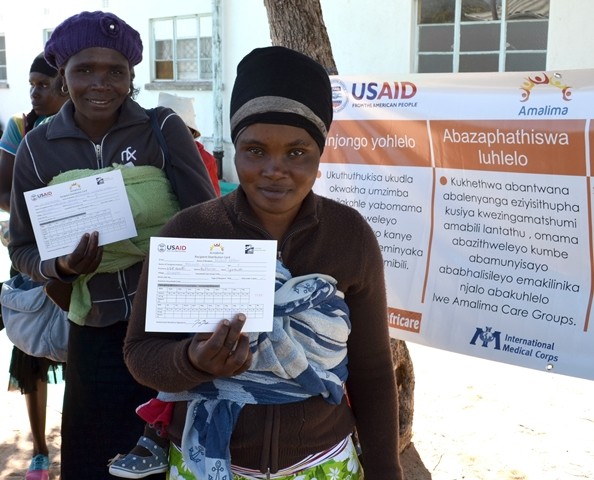
For Immediate Release
Gwanda, Matebeleland South, December 10, 2014. To improve nutrition and support rural households in Matabeleland North and South, the United States Agency for International Development (USAID) is providing fortified supplementary food to pregnant and lactating women and children under the age of two years. This year alone, USAID has distributed 220 metric tons of supplementary food to 17,000 mothers and children, which is distributed through 56 rural clinics in the two provinces. Through this Food for Peace Program implemented by CNFA, called Amalima, mothers and caregivers receive training and support in child care, feeding and hygiene practices.
The program applies a set of innovative approaches that build on existing communal initiatives. The program’s name, Amalima, is the word for the Ndebele custom by which families come together to help each other (Nhimbe in Shona). The program is implemented by a consortium of NGOs led by CNFA, including Organization of Rural Associations for Progress (ORAP), Dabane Water Works, International Medical Corps, the Manoff Group, and Africare.
Reflecting on the past year, Amalima’s Chief of Party, David Brigham commented, “It has been heartening to see how the program has been welcomed and supported by both participating communities and local and national government. This is a clear indication that our activities are relevant to people’s lives and in-line with the government’s Food and Nutrition Security Policy. This has allowed us to establish operations quickly and meet our first year’s goals, and will help ensure that we will have tremendous impact over the next four years.”
"We are very pleased that Amalima has been largely successful in meeting its first year goals. We very much look forward to working with CNFA and participating communities to ensure ongoing impact in the areas of nutrition, agricultural production, and food security as the project continues over the next four years," said Suzanne Truchard, Deputy Director of USAID/Zimbabwe’s Office of Humanitarian Assistance and Resilience.
USAID is improving maternal and child health and nutrition, agricultural production and marketing, and community resilience in its target districts of Gwanda, Bulilima, Mangwe, and Tsholotsho. In coordination with local technical specialists, USAID has provided more than 20,000 people with agricultural, financial, and disaster risk reduction trainings, rehabilitated community gardens, built water and sanitation facilities in clinics, and reclaimed gullies in areas affected by flooding.
Amalima will present results from its first year of programming with the Matabeleland South Food and Nutrition Security Committee. Representatives from the provincial and district local government, USAID, and other members of the development community will be present. This meeting will inform stakeholders of USAID’s activities through Amalima and solicit feedback for ways to improve efforts.
USAID helps rural Zimbabweans through programs that build their economic resilience, increase incomes and agricultural productivity and ultimately, improve food security. USAID's food security programs range from emergency food assistance to long-term development assistance.
For additional information, please contact Public Affairs Officer, Karen Kelley at kelleyk@state.gov or Program and Project Development Officer, Melissa Scherer at mscherer@usaid.gov







Comment
Make a general inquiry or suggest an improvement.